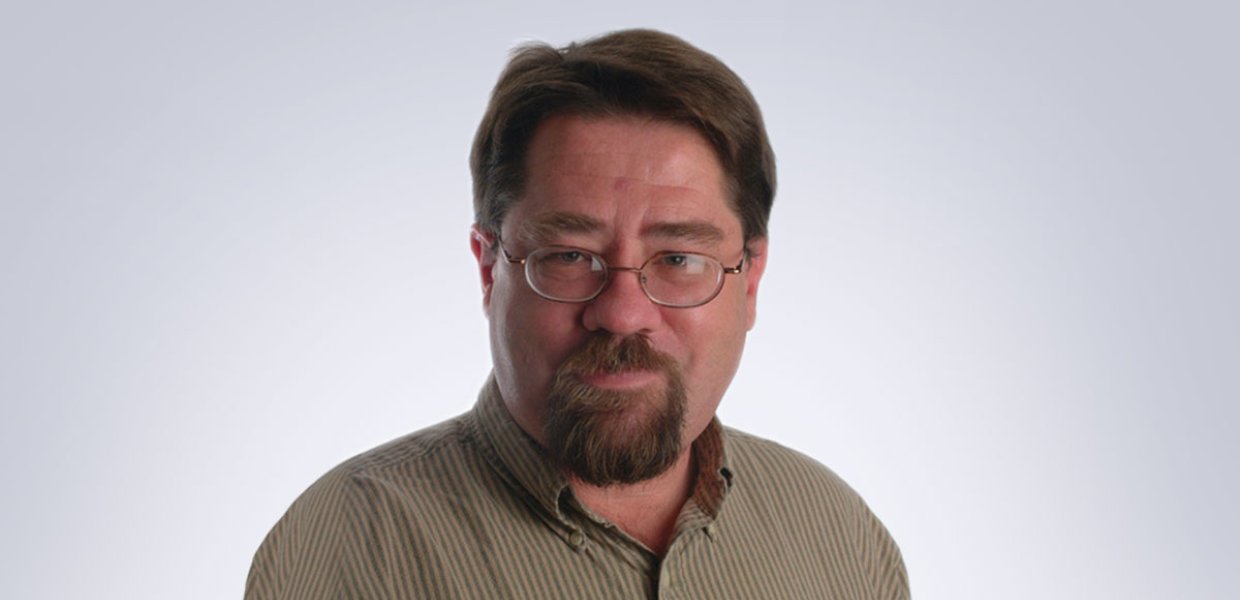Stephen D. O’Leary, a former associate professor of communication at USC Annenberg known for his scholarship on religion and media, as well as his love of choral music, has died. Suffering from liver cancer, he passed away on Jan. 24, according to his family. He was 60 years old.
“Stephen was a bright, kind and unselfish colleague and professor,” said Professor Tom Hollihan. “He had a unique capability to inspire both his undergraduates and graduate students. His memory will always live on in the hearts of those whose lives he touched.”
After earning a bachelor’s degree in comparative religion from Harvard University, O’Leary embarked on a round-the-world trip as a merchant seaman before joining the communication studies doctoral program at Northwestern University, said G. Thomas Goodnight, now professor of communication at USC Annenberg, who was O’Leary’s dissertation advisor at Northwestern. The two reconnected — even becoming officemates.
“He had his mind set on studying the rhetorics of apocalypse,” Goodnight said. “His dissertation was accepted straight out by Oxford University Press, with great praise. He led the way in early internet studies, particularly when religion made up so many of those seeking remote connections. I learned from Stephen much about writing and tolerance for groups of people with peculiar beliefs and expectations of the world.”
His doctorate completed, O’Leary joined USC Annenberg as an instructor in 1989, becoming an assistant professor in 1991 and rising to associate professor in 1996, a rank he held until his departure in 2016.
His research focused on religious communication, rhetorical theory, and criticism. O’Leary is the author of Arguing the Apocalypse, a study of the rhetoric of millennialism in American culture, and also edited the collection War in Heaven/Heaven on Earth: Theories of the Apocalyptic. His deep knowledge of fringe religious movements made him a leading source for stories about the Heaven’s Gate cult, many of whose members committed mass suicide in 1997.
Raised a Catholic, O’Leary explored numerous other spiritual traditions in his scholarship. Lucy O’Leary, one of his three children, says that this openness to differing perspectives informed his teaching. “I sat in on one of his lectures, and when I thought about it later, I understood what he was trying to do,” she said. “His teaching was committed to presenting alternative and counternarratives in such a way as to open up space for those narratives to be critically analyzed.”
Outside of the classroom, O’Leary had a passion for music. A 1991 Los Angeles Times article profiled O’Leary and his then-wife Mary Rose as founders of the Los Angeles Area Shape Note Singers. The group, which is still active, gathers to sing Christian hymns written out in shape note, a unique musical notation — also known as Sacred Harp — that was developed more than two centuries ago. Even though Stephen and Mary Rose O’Leary divorced in 2002, they have remained connected through their involvement in the revival of Sacred Harp. Having moved to San Rafael in recent years, O’Leary returned to Los Angeles a few weeks ago for the 32nd Annual All-California Sacred Harp Singing Convention on Jan. 18-19 — of which Mary Rose O’Leary was chair, Lucy O’Leary said.
In a Jan. 22 Facebook post, Stephen O’Leary wrote that he chose the convention as the time to tell his fellow singers about his cancer, noting that he had scheduled his latest round of chemotherapy treatment around attending the gathering.
“Short version: Cancer. It’s looking grim,” he wrote. “Now going through chemotherapy. But I’m doing well — well enough to sing. I plan to keep singing until I die (which I hope will not be anytime soon) and even after.”
“Those of you who know me well know how important this singing has been to me for the last 35 years,” he wrote. “Some people find the songs morbid and strange, since many of them are about death and dying; but I always say I never feel so alive as I do when singing about death at the top of my lungs in a roomful of people I love.”
“Please keep me in your thoughts and prayers,” he wrote, “and I hope to sing with all of you sometime soon — by which I mean, I hope to sing with you here on earth, long before I go to sing with the ‘choir invisible.’”
A memorial for O’Leary will be held Feb. 29 at the Sacred Heart Church in the Marin County community of Olema, with a gathering to follow in Inverness.
He is survived by his mother Helen “Tibby” O’Leary, his siblings Anne, Clare, Paul, Kate and Richard O’Leary, and his loving children Lucy, Rachel and Isaac.
